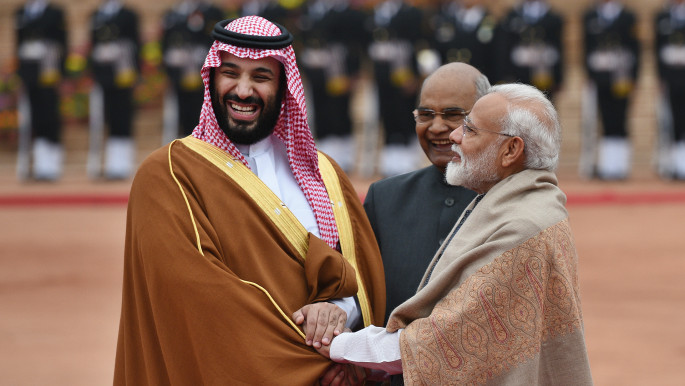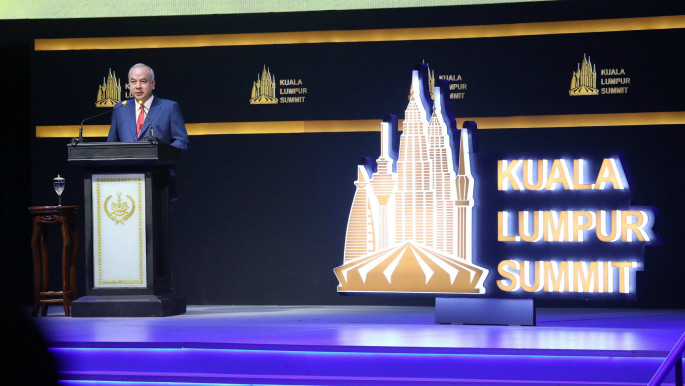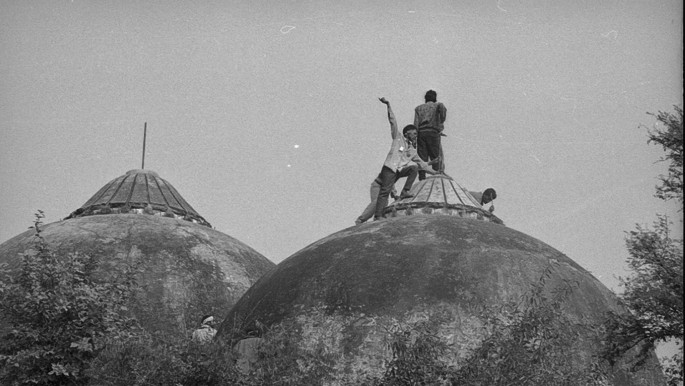Modi's anti-Muslim moves threaten unholy alliance between India and Arab allies
The new entity – often referred to as Muslim 5 bloc - took on India's new controversial citizenship law, widely described as anti-Muslim, and Prime Minister Narendra Modi who has remained unfazed by the nation-wide protests against the law. It declared the law, known as Citizenship Amendment Act (CAA), as discriminatory against Muslims and warned of chaos if it is not repealed.
Read also: 'A threat to the plural structure of India': Anger brews over controversial citizenship law
The damning response from the new Muslim group is a major setback for Modi as it has nearly undone feverish efforts made by top Indian diplomats at international forums to contain the global rage against the new legislation that refuses to provide citizenship to illegal immigrants from Pakistan, Bangladesh and Afghanistan.
Also, it has prompted the largest representative of Muslim nations, Organisation of Islamic Conference (OIC), a good friend of India, to openly express concerns over New Delhi's actions.
PM Modi now faces the challenging task of navigating an unfamiliar and tricky geo-political situation in order to keep intact the close partnership he has forged with Saudi Arabia, the United Arab Emirates (UAE) and others.
India's pivot to the Middle East
 |
|
| Read also: Are billion dollar investments in India prompting Saudi Arabia's silence over Kashmir? |
India's pivot to the Gulf nations under Modi has been a remarkable story that has left foreign policy experts wondering how a government led by a Hindu-nationalist party, the Bharatiya Janata Party (BJP), could pull off such a powerful alliance in a short span of time.
The triangular love affair between India, Saudi Arabia and the UAE has seen their leaders exchanging foreign visits including a red carpet rolled out for the Saudi Crown Prince, Mohammed bin Salman (also known as MbS) in New Delhi when he was shunned by his Western allies following the murder of Jamal Khashoggi.
Modi's frequent trips to the Gulf have made him the only Indian leader in history who has visited all Gulf Cooperation Council (GCC) countries while in power.
 |
Modi's frequent trips to the Gulf have made him the only Indian leader in history who has visited all GCC countries while in power |  |
On business front, Modi, a shrewd politician known for seizing opportunities, widely opened India's doors to the Middle Eastern countries, in particular Saudi Arabia and the UAE just when the oil-rich nations were actively looking to diversify their resources to non-oil assets.
Saudi Arabia is India's fourth-largest trading partner and India-UAE annual bilateral trade stands at $55 billion. In a landmark deal in August, Reliance Industries, headed by Asia's richest man Mukesh Ambani, sold 20 percent stake in its oil-to-chemical business to Saudi Aramco, boosting the Arab firm's efforts to expand its refining and petrochemicals portfolios.
Both Riyadh and Abu Dhabi have also signed a deal to jointly build a mega refinery in India with an investment of around $60 billion.
In return, Modi wanted the Arab heavyweights' silence, if not endorsement, of his government's recent controversial actions such as abrogation of Kashmir's special status and the implementation of the citizenship law. And this was happily granted by Riyadh and Abu Dhabi, both of whom also recently conferred Modi with their highest civilian honour.
India even got an unprecedented entry to the OIC where Saudi Arabia wields considerable influence as well as other Gulf forums. Former Indian Foreign Minister Sushma Swaraj was invited to deliver a talk in March last year at an OIC conference that was boycotted by Pakistan, India's arch rival who has long lobbied to keep New Delhi at bay.
 |
The OIC, which once used harsh language to describe India's actions in Kashmir, gradually toned down its rhetoric on human rights violations in the region, coinciding with flourishing ties between India and the Gulf |  |
The OIC, which once used harsh language to describe India's actions in Kashmir, gradually toned down its rhetoric on human rights violations in the region, coinciding with flourishing ties between India and the Gulf. It has resisted growing calls to hold a special meeting to discuss human rights violations in Kashmir.
Fallout from the Muslim 5 summit
However, things changed after the Muslim 5 summit. For the first time, Modi's extended honeymoon with the Gulf countries felt under threat.
The OIC which was expected to keep its silence on the citizenship law, made a statement condemning the move.
Further, Saudi Arabia made a promise to Pakistan that a special meeting of the OIC would be held to discuss the Kashmir issue. Both developments were embarrassing for India and officials frantically tried to contain the subsequent damage. But Indian analysts felt first cracks had appeared in the strategic partnership between India and its key Arab allies.
 |
|
| Read also: Does Saudi Arabia feel threatened by the new Muslim alliance? |
Another worry for New Delhi is that Pakistan, deserted by its traditional Arab friends, has found new allies in Malaysia, Turkey and Iran who are least bothered about India's threats of economic choking.
India fears that that Pakistan, frustrated by the cold to lukewarm responses by its long-standing allies Saudi Arabia and the UAE, would use the new forum in the long run to gain leverage over them, effectively putting brakes on Modi's rapidly growing rapprochement with the Gulf states.
The fact that discussions for a new Muslim grouping were not even in picture until India's controversial moves in Kashmir indicates the bloc may well have had its eyes on issues faced by Muslims in India.
Pakistan's Prime Minster Imran Khan was a key player in sowing the first seeds of the Muslim 5 grouping on the sidelines of a UN General Assembly session in September.
In further evidence of the new group's future focus on Indian Muslims, the loudest criticism during its first Kuala Lumpur summit came against India even though it was supposed to focus its attention on key Arab issues such as war in Yemen and an ongoing blockade against Qatar led by Saudi Arabia.
Tricky days ahead
For now, the summit should be seen as a win-win situation for Saudi Arabia and Pakistan. For Riyadh, Pakistan's late pull out from the summit was a snub to its regional rivals while in return Islamabad was granted its request for an exclusive OIC session to discuss Muslims' plight in India.
However, in the long run things do not look good for the OIC and India for several reasons. First, it is possible that the five nations could continue their rhetoric against oppression of Muslims globally, in particular in Palestine and Kashmir. This means the OIC risks losing its narrative on the two key Muslim issues that have formed the founding principles of the OIC.
In such a scenario, it would be forced to show some flexibility and become more vocal on Muslim issues in order to protect its relevance as the largest body representing Muslims across the world. This concern was echoed in an article by a right-wing Israeli think-tank which noted that the Kuala Lumpur Summit could establish pro-Palestinian positions.
 |
For India, the biggest worry is that Pakistan will likely continue to use the Muslim 5 bloc to put pressure on Saudi Arabia and the OIC on matters related to Indian Muslims |  |
Second, for India, the biggest worry is that Pakistan will likely continue to use the Muslim 5 bloc to put pressure on Saudi Arabia and the OIC on matters related to Indian Muslims.
 |
|
| Read also: Pondering their future in their own homeland: Muslims fearful in a hate filled India |
India also faces the prospect of being forced to compromise its foreign policy principles in particular its longstanding idea of not taking sides in international conflicts.
New Delhi has already broken that tradition when, in a rare move, it openly criticised Turkey's military intervention in northern Syria following the US troops' withdrawal from there. PM Modi then scrapped a key defence project offered to the Turkish defence company, Anadolu Shipyard, all in response to President Recep Tayyip Erdogan's condemnation of India's abrogation of Kashmir's special status.
In short, Modi's actions may have pushed him into unchartered waters of geopolitics. His next moves, if not made carefully, could snowball quickly and leave him in an even more complicated territory.
But he is a stubborn negotiator sitting on one of the world's largest economies and he knows that allies would come knocking anytime.
Shan. A. Zain is a journalist and writer based in New Delhi, covering foreign policy and international security issues in Asia and the Middle East.
Follow him on Twitter: @shaan_zain





 Follow the Middle East's top stories in English at The New Arab on Google News
Follow the Middle East's top stories in English at The New Arab on Google News


